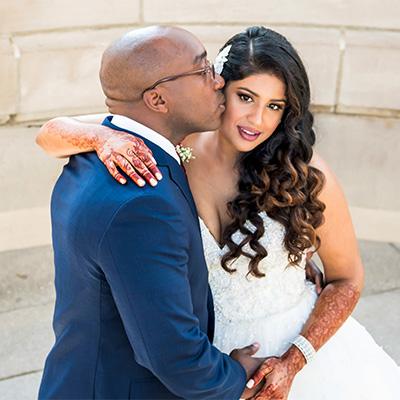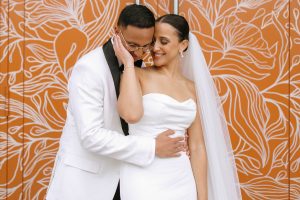Two Worlds, One Family
Planning and Prepping for your Cultural Fusion Wedding
Along with being a day to declare your love and commitment to your significant other, your wedding can be an opportunity to pay homage to your cultural heritage. Most cultures have customary wedding traditions that brides and grooms might be expected to follow. But if you and your partner come from different cultural or religious backgrounds, going the traditional route may not be an option. Instead, you might be wondering how best to incorporate elements that not only honor all the diverse customs from both your backgrounds, but also appease your families.
Communication is Key.
Before you dive into the details of your wedding planning process, it’s important to communicate with your partner from the very start. Have an open conversation with your fiancé about which of your traditions are must-haves. If one of you is Jewish, will you exchange vows under a chuppah or sign a ketubah? If either of you is Greek, will the money dance be part of your reception?
Being upfront with each other will give you a much better idea of how to organize the events of your wedding. Your decisions should reflect what works best for both of you, without sacrificing important parts of your identity. At the same time, keep an open mind and be prepared to compromise. You don’t want to upstage the needs of your fiancé.
Keep your families in the loop.
While decisions you make for your wedding are completely up to you and your fiancé, it’s a good idea to keep an open line of communication with both of your families. Not only will this prevent any unexpected surprises on the day of, but your family might make great consultants. Parents and grandparents can often offer their wisdom if you are unsure about any of your cultures’ wedding day rituals. Along with being a great resource, your family will surely appreciate you going the extra mile to include them in the planning.
It’s also encouraged to take time to educate both your families on each other’s traditions. They will undoubtedly be curious and explaining your reasons behind certain choices might help to ease any concerns they might have. If there’s cultural etiquette that may not translate, be honest with them about it. This is the best way to avoid any accidental faux pas on your wedding day.
Create an informational program.
Many weddings offer guests an itinerary prior to the ceremony. If you choose to make one, it might be helpful to write brief summaries of traditions your guests might not be familiar with. If you don’t want to add another stationery piece to your list, then you might have your officiant explain the rituals before conducting them. Not only will this prevent confusion for your guests, but it will also help them understand the significance of what you’re doing.
Set the scene with an appropriate venue.
Choosing a venue to host your ceremony might be the trickiest decision yet, especially if you and your soon-to-be spouse come from two different religious backgrounds. It’s very common for couples to get married in places of worship, but a ceremony at a Catholic cathedral if you or your fiancé is Muslim may not be the greatest fit. Unless you and your spouse decide otherwise, a traditional wedding ceremony venue might not be wanted by either of you. If you do decide to have your wedding in a religious institution, you will want to research your venue to make sure they will honor interfaith ceremonies.
In the end, you may choose to avoid religious institutions altogether by exchanging vows in a neutral location. If you plan on getting married during the warmer months, for example, a gorgeous outdoor ceremony on the beach could be a great solution. Likewise, during chillier times of the year, you might decide to host both your ceremony and reception in an indoor garden.
Find a flexible officiant.
Crafting a multi-cultural ceremony where each family’s traditions and customs are represented is undeniably challenging, so choosing the right officiant is crucial. Pick an officiant experienced with seamlessly blending elements of different religions and cultures. Finding the right officiant might take a bit of research. Don’t stop looking until you find the perfect fit–someone willing to give you the ceremony experience you desire.
You might also decide to take it a step further by hiring two officiants to represent both backgrounds. This is an excellent compromise that equally respects and includes your two cultures.
Save the (right) date.
In some cultures, there may be certain dates you will want to avoid for your wedding. For example, according to Chinese tradition, certain dates are considered more favorable for marriage, while others could signify bad luck. Also, be mindful of any notable cultural events. You wouldn’t want to risk offending your guests by making them choose between your wedding or a beloved holiday. Consult your families to find out if there are any dates you should avoid if you want to observe these aspects of your collective cultures.
Choosing your attire.
Wedding attire varies widely across different cultures. Colorful lehengas or saris in rich tones of red and gold are standard garb for brides of Indian cultures, while white Kimonos are customary for the traditional Japanese bride. But you don’t have to fully commit to one look for your cultural fusion wedding. If you have South Asian Roots but want to incorporate a more westernized style, wear a sweeping white gown, but then also incorporate the Mehendi ceremony of intricately applying henna to your hands. You can experiment with different combinations of attire to find what works best for you.
Craft the perfect fusion menu.
As the tastiest part of the day, you will want to create a menu that your guests can thoroughly enjoy. Some cultures and religions abide by certain dietary restrictions, so take extra care when choosing which foods will be served. While it’s impossible to please everyone, variety should be a priority to avoid offending guests who are unable to eat certain items. If you go for a buffet-style instead of a plated dinner, it’s polite to properly label all the dishes to make it easier for guests to navigate your wedding meal. Cocktail hour is another great opportunity to pay homage to traditional cultural cuisine by offering a nice sampling of different hors’ d’oeuvres. Maybe including flaky Spanakopita or melt-in-your-mouth Tirokroketes as a nod to Grecian roots. Likewise, if you decide to have a wedding cake you might also consider having a dessert table filled with sweet delicacies from both your cultures.
Entertain your guests.
In some cultures, weddings are bold, lively parties filled with dancing and jubilation; while in other cultures they are more solemn, ritualistic affairs. Consider the diversity of your guest list and tailor your entertainment to what you think will appeal to the majority. A DJ can play a mixture of traditional music along with more popular songs. Or, you might choose to stick to a playlist of your choosing altogether.
If you plan on performing any traditional dances, make sure to inform your wedding coordinator and DJ well in advance to handle any prior preparations. Similar to the ceremony, alert your guests so that they understand what you’re doing. If the dances are simple enough, you might offer the opportunity for guests to learn the steps so that they can join in on the fun!
Planning a cultural fusion wedding is challenging, but it doesn’t have to be overwhelming. While you may feel pressured by your family to follow certain traditions and rituals, remember at the end of the day you get the final say in what you do. When all is said and done, your wedding will mean more than just uniting your families. It will be the marriage of all the beautifully complex customs and practices that make up your unique backgrounds.




